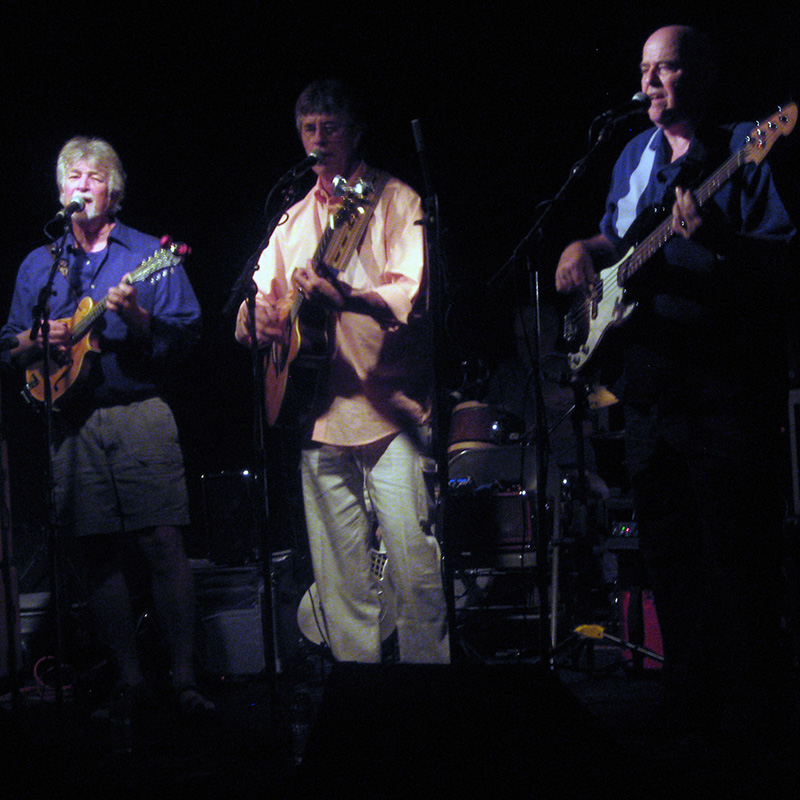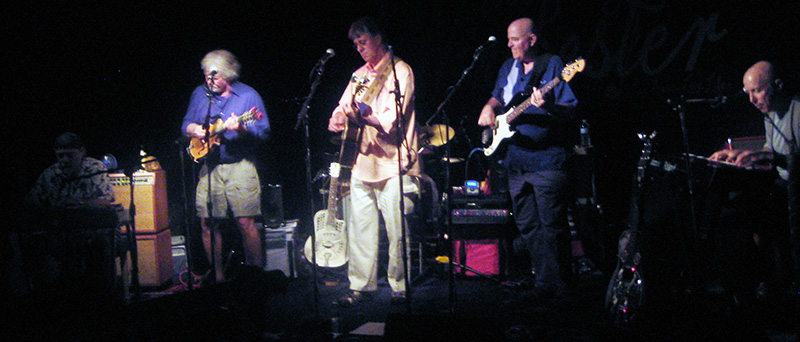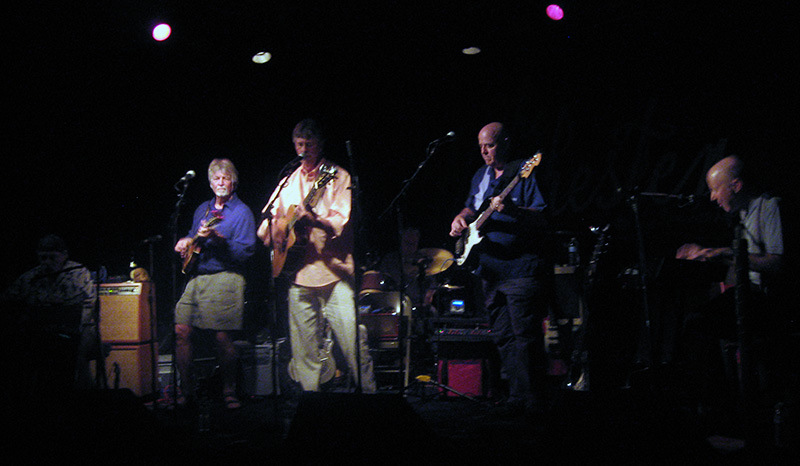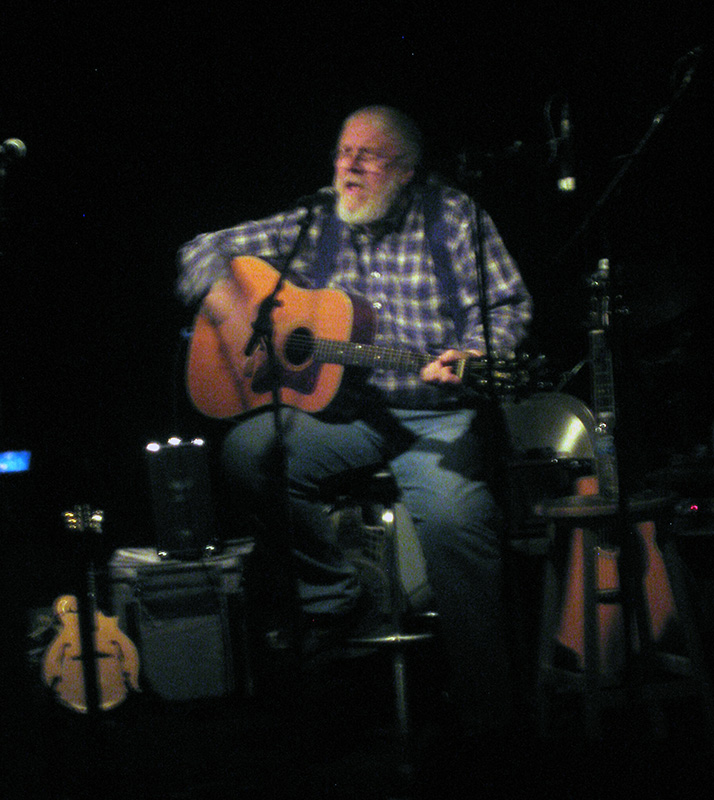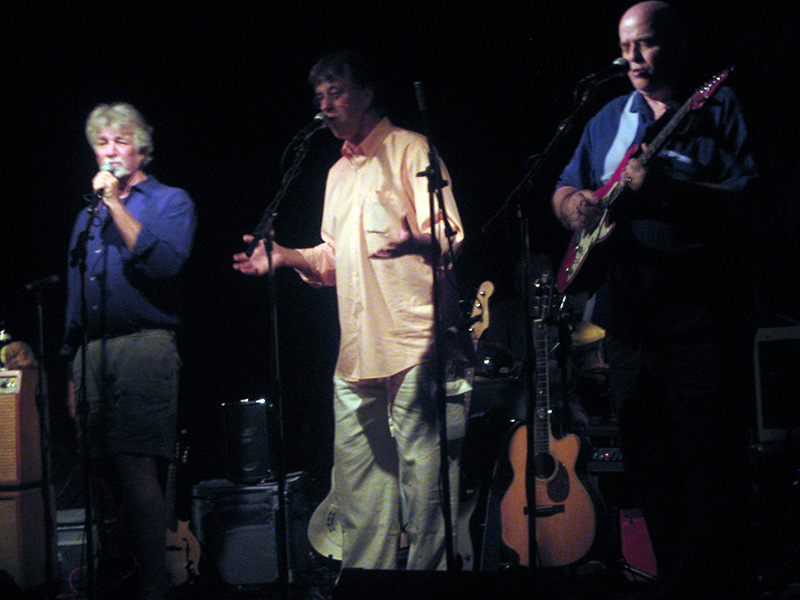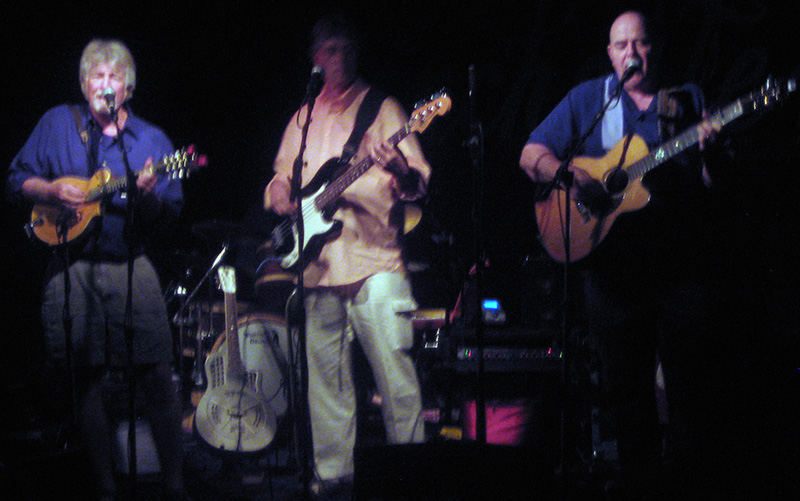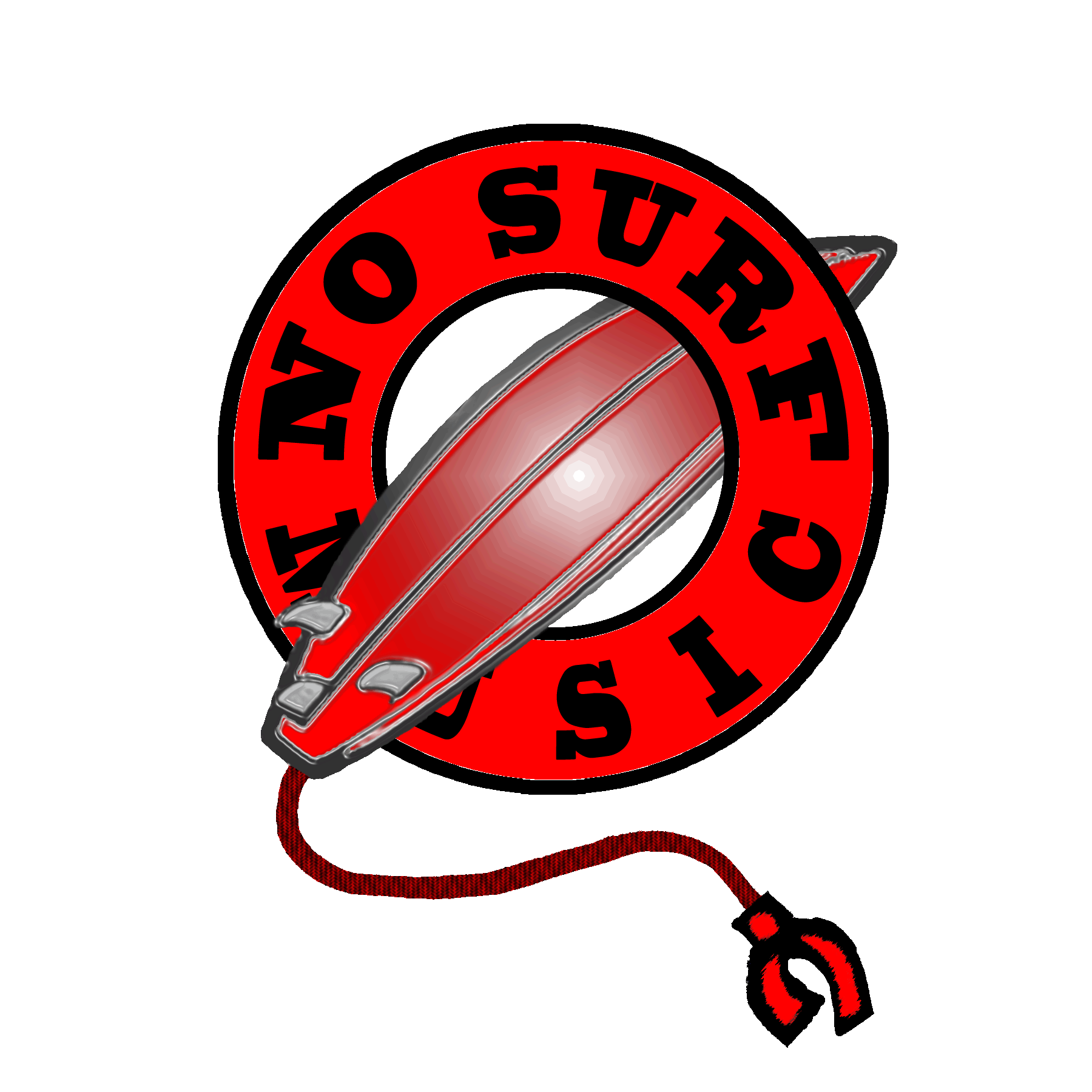
The Lowdown:
August 12, 2011
Marley's Ghost: Winchester Music Hall, 8/6/11
by Jason D. 'Diesel' Hamad
Marley's Ghost fills the stage at the Winchester Music Hall in Lakewood, Ohio. (l-r) Ed Littlefield, Jr., Jon Wilcox, Dan Wheetman, Mike Phelan, Jerry Fletcher. Photo by Jason D. 'Diesel' Hamad, No Surf Music.
The music industry is a very weird place. Some bands, say Mumford & Sons, barely pick up their instruments before they’re famous worldwide and playing in front of stadium crowds. Others, for instance The Vaselines, may be just as talented but labor in obscurity their entire careers, never really taking off and possibly only finding respect years later. Countless others, worth discovering or not, simply remain obscure forever. Strangest of all are the in-betweens, the bands that have a long career, gain a rabid following of cultish fans, but who remain unknown to the world at large. One band that fits into this category is Marley’s Ghost.
Each member of Marley's Ghost has had a long career in music, and each plays multiple instruments. Although they generally stick to their own turf, they do sometimes mix it up a bit, as here, where bassist Dan Wheetman plays guitar and guitarist Mike Phelan takes over duties on the bass. Photo by Jason D. 'Diesel' Hamad, No Surf Music.
The band’s members are all multi-instrumentalists and all vocalists, giving them an ability to blend five-part harmonies and musical mixes in a way that is rarely seen. Each also has a unique background that adds to the group’s diverse stylistic melting pot. Bass player Dan Wheetman started out in a California teen rock group and is a Tony-nominated playwright who toured in John Denver’s band and once had a song recorded by Kermit the Frog. Mandolin player Jon Wilcox has a degree from Stanford Law, taught high school history, and specializes in preserving and interpreting American and British folk music. Pedal steel player Ed Littlefield, Jr. started out in the Northern California folk scene before founding his own music studio in Washington and was so upset when Sierra Steel Guitar Company went bankrupt that he bought the firm to keep them in production. Guitarist Mike Phelan has been playing since the age of five and creates music and voiceovers for advertising. The band’s newest member, Jerry Fletcher (who has played on their albums since the beginning, but became “official” in 2006), started on drums but recently moved to full-time duties on the keyboard after a long career that includes founding his own music school for children and playing as a member of 70’s country rock band Liberty (with Wheetman) and with John Denver, Jimmy Rogers, Steve Martin and the Nitty Gritty Dirt Band.
With all of this coming together, the group is definitely an enigma. They’re a little bit country, a little bit bluegrass, a little bit gospel, a little bit blues, a little bit rock, a little bit reggae, a little bit everything. In truth, they’re a real folk band, one capable of producing their own music, but also adeptly taking music from any source and making it their own. This is probably the reason that after a career spanning nine albums over more than a quarter century that has seen them work with some of the best producers and musical talents in the industry, they’re still relatively unknown, at least outside of their home turf on the West Coast. They don’t fit neatly into any one slot in the CD rack, so the marketing gurus don’t know what to do with them. It’s ironic that having the talent to play almost any genre of music would actually hold a band back, but as I said, the music industry is a very weird place.
Still, Marley’s Ghost (named not for a Dickensian character, but that other Marley, the one with the legendary joint-rolling skills) continues to gain accolades and adherents, doing things the hard way and building their fan base one gig and one market at a time. Touring in support of their most recent album Ghost Town, and with another in the works—both recorded with the guiding hand of legendary Nashville producer Cowboy Jack Clement—the band stopped by The Winchester Music Hall in Lakewood on Cleveland’s West Side to introduce themselves to Northeast Ohio. It’s a shame more Clevelanders didn’t take advantage of the opportunity.
Opened in late 2002, the Winchester is an old-school music hall, the kind you might have found in any town back when live music was an integral part of people’s lives and the sound mattered more than being hip. In fact, it’s decidedly unhip. It’s the kind of place that would make the cast of the Jersey Shore break out in hives, which means it’s just perfect for No Surf. With a full-sized bar up front and an even larger music space in back, it’s built for practicality, not flash. Intimate lounge-style seating is located on a raised platform directly in front of the stage, with small tables each surrounded by four chairs. Stage right is bounded by a wall, but the left side is filled with more seating, this time in the form of several rows of folding chairs. It’s not posh, but what’s important is the music, and the unpretentious, humble setting suggests that that’s what the venue was designed for. No matter where one sits, the view of the stage is terrific, and with near-perfect acoustics, the sound is even better. That may explain why the venue has been named tops in Cleveland in several surveys.
Local singer Bob Sammon opened the show with a classic one-man folk set, easing the audience into the night's entertainment. Photo by Jason D. 'Diesel' Hamad, No Surf Music.
On this particular occasion, the seats at the side were empty, as the entirety of the small crowd fit in the space in front of the band. The night before, Marley’s Ghost had played an outdoor concert in Pittsburgh with 3,700 in attendance. In Cleveland, they drew just a couple of dozen. Them’s the ropes for a touring band. Those few who did show up, however, were treated to a unique musical experience.
The opener was local singer Bob Sammon with an old-school stool-and-guitar folk act. At about 60 years of age, he’s reminiscent in appearance to Utah Phillips (although if you know what Utah Phillips looked like then you should be the music writer), and he gives an air of grandpa gathering the brood around to sing a little, which is a refreshing feel in the often overly stylized world of music. Counting among his influences Woody Guthrie, Pete Seeger, Bob Dylan, Townes Van Zandt and the Smothers Brothers, he got his start playing in the New York folk scene in the late 60’s before taking a long break to raise a family. A couple of years ago he started back up again and it’s obvious the coffee house vibe never wore off. These days his set list includes a mix of traditional folk, more contemporary songs, and his own creations. With a light touch and a mellow sound, it was a pleasant start to the evening.
Taking over the stage, Marley’s Ghost began their wide-ranging set with “The End Is In Sight” by country singer Russell Smith. This was followed up by a song from their as-yet-unnamed upcoming album, “Travelin’ Teardrop Blues,” which showed off the band’s powerful instrumental mix. They then broke into “Less and Less,” a paradoxically mellow but lively country-infused number off of Ghost Town about a rambling life, the lessons it teaches, and getting by with what you’ve got. It featured a great pedal steel break courtesy of Littlefield, dueling with Fletcher’s keys. The next song was another slated for the new album, “Rollin’.” Penned by Wheetman, who describes it as a “modern-day truck-driving song,” it is more literary than most Red Sovine-like compositions, likening the landlocked teamster to a shipwrecked mariner.
Despite their instrumental abilities, the band doesn't mind dropping them now and then to let their vocal harmonies shine even brighter. Photo by Jason D. 'Diesel' Hamad, No Surf Music.
Proving the band’s eclectic nature, Wheetman introduced the next song by saying, “We’ve often been accused of being a country band, and the country for this next song is Jamaica.” They then reached back to their 1998 album Across the River for “Guava Jelly,” a song written by the band’s namesake. The Ghost version is lively and gives the reggae beat an interesting acoustic touch.
Changing gears again, they sang two songs with a religious theme, both a capella (appropriate given the literal translation of that term). They started with “Religion in Rhythm,” which the band recorded on 2006’s Spooked. As Wheetman explained it, the album’s producer Van Dyke Parks used more instruments in the studio than they could carry around, so Jerry Fletcher arranged it as a vocal number. With a bit of swing, lively five-part harmonies and a quick beat, it had a bit of a barbershop feel and would fit into the repertoire of any college a capella group. Next came “The Story of Job” with a more traditional gospel feel, complete with church-pew clapping to provide the rhythm.
This was followed by my personal highlight, the band’s rendition of Levon Helm’s “Poor Old Dirt Farmer.” With the exception of pedal steel taking the place of fiddle, the Marley’s Ghost version differs little from the original, but is given an entertaining twist when sung by Ed Littlefield, who in his other life really is a farmer (that’s where his studio is, after all). He even sounds a little like Levon. Jerry’s work on the accordion, Mike on the Dobro, and Jon’s dancing mandolin all added to the lighthearted mix, and the vocal harmonies were sublime.
Wilcox then sang the Kris Kristofferson song “This Old Road,” actually resembling the raspy legend a little bit with his beard and frock of white hair. The song will appear on the band’s release-in-the-works and feature John Prine. This was followed by another selection from the new album, “Lonely Enough to Know,” sung and written by Mike Phelan. A bit of classic country action, it featured prominent pedal steel and a strummed mandolin.
Starting with a keys-pounding piano solo and an “Awwwwww, Jerry” call, the band then jazzed it up a bit with a little Western swing in the form of the traditional “Corrina, Corrina.” No such song would be complete without a pedal steel solo—and Ed turned in a great one—but each member took their turns in the spotlight and Mike on electric guitar and Jerry on keyboard turned in some especially fine licks.
Country to folk to reggae to blues and back around again, Marley's Ghost plays it all. Photo by Jason D. 'Diesel' Hamad, No Surf Music.
This was followed by another selection from Ghost Town, the slow country lament “Goodbye to Old Missoula” by Gordon Alan Ramsey, and then one off of 1991’s Ghost Country, the Jesse James-themed “One More Shot.” The band then once again took pains to demonstrate their wide-ranging influences, playing the Grateful Dead number “Liberty,” taking the Dead’s country roots, extracting them, and distilling them into a potent cocktail with just a hint of jam band. They closed the set with a pair of blues numbers, “Goin’ Down Slow” and “Drop Down Mama.” Although Wheetman wailing on the harmonica was a highlight of these numbers and the band’s blues style is fairly rocking, it seemed an odd choice to end on a relatively down note after so many buoyant acoustic numbers.
This may not have been the best opportunity to evaluate the band’s performance, since the setting was a bit odd. The small crowd was a little restless, as was the band at times, and the humor that punctuates their show may work in a more infectious setting, but fell flat here. Still, there’s no doubt that all the members display an impressive musical skill, with the highlights centering around the complex vocal harmonies, Ed Littlefield’s unique pedal steel and Jon Wilcox’s distinctly unbluegrass mandolin, with breakout moments from all the members. It’s also obvious that the band can play just about any form of music well. For marketers this may mean they’re hard to describe, but for music lovers it means that no matter what you like, you should consider checking them out the next time they roll through your town.
| mp3 | cd |
|---|---|



